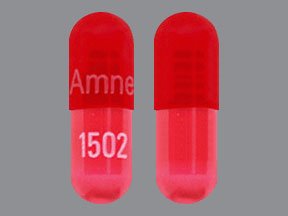Phenoxybenzamine
Generic name: phenoxybenzamine [ fen-OX-ee-BENZ-a-meen ]
Brand name: Dibenzyline
Dosage form: oral capsule (10 mg)
Drug class: Miscellaneous cardiovascular agents
What is phenoxybenzamine?
Phenoxybenzamine is used to control blood pressure and reduce sweating in people with pheochromocytoma (tumor of the adrenal gland).
Phenoxybenzamine may also be used for purposes not listed in this medication guide.
Phenoxybenzamine side effects
Get emergency medical help if you have signs of an allergic reaction: hives; difficult breathing; swelling of your face, lips, tongue, or throat.
Stop using phenoxybenzamine and call your doctor at once if you have severe dizziness or if you feel like you might pass out.
Common side effects of phenoxybenzamine may include:
-
stuffy nose;
-
mild dizziness or drowsiness;
-
blurred vision;
-
trouble having an orgasm;
-
upset stomach; or
-
tired feeling.
This is not a complete list of side effects and others may occur. Call your doctor for medical advice about side effects. You may report side effects to FDA at 1-800-FDA-1088.
Related/similar drugs
Warnings
Follow all directions on your medicine label and package. Tell each of your healthcare providers about all your medical conditions, allergies, and all medicines you use.
Before taking this medicine
You should not use phenoxybenzamine if you are allergic to it.
Tell your doctor if you have ever had:
-
coronary artery disease (hardened arteries);
-
a lung infection; or
-
kidney disease.
Tell your doctor if you are pregnant.
You should not breastfeed while using phenoxybenzamine.
How should I take phenoxybenzamine?
Follow all directions on your prescription label and read all medication guides or instruction sheets. Your doctor may occasionally change your dose. Use the medicine exactly as directed.
Call your doctor if you have fast heartbeats. You may need to be treated with an additional medication.
Store phenoxybenzamine at room temperature away from moisture and heat.
Phenoxybenzamine dosing information
Usual Adult Dose for Pheochromocytoma:
Initial dose: 10 mg orally twice daily
Maintenance dose: 20 to 40 mg orally 2 to 3 times daily until an optimal dosage (as judged by blood pressure control) is obtained.
What happens if I miss a dose?
Take the medicine as soon as you can, but skip the missed dose if it is almost time for your next dose. Do not take two doses at one time.
What happens if I overdose?
Seek emergency medical attention or call the Poison Help line at 1-800-222-1222.
Overdose symptoms may include fast heart rate, vomiting, dizziness, or fainting.
What should I avoid while taking phenoxybenzamine?
Avoid driving or hazardous activity until you know how phenoxybenzamine will affect you. Your reactions could be impaired.
Avoid getting up too fast from a sitting or lying position, or you may feel dizzy.
Drinking alcohol with this medicine can cause side effects.
What other drugs will affect phenoxybenzamine?
Tell your doctor about all your other medicines, especially:
-
epinephrine (Epi-Pen), norepinephrine; or
-
blood pressure medications.
This list is not complete. Other drugs may affect phenoxybenzamine, including prescription and over-the-counter medicines, vitamins, and herbal products. Not all possible drug interactions are listed here.
More about phenoxybenzamine
- Check interactions
- Compare alternatives
- Pricing & coupons
- Drug images
- Side effects
- Dosage information
- During pregnancy
- Drug class: miscellaneous cardiovascular agents
- En español
Patient resources
Other brands
Professional resources
Other brands
Related treatment guides
Further information
Remember, keep this and all other medicines out of the reach of children, never share your medicines with others, and use this medication only for the indication prescribed.
Always consult your healthcare provider to ensure the information displayed on this page applies to your personal circumstances.
Copyright 1996-2025 Cerner Multum, Inc. Version: 4.01.

